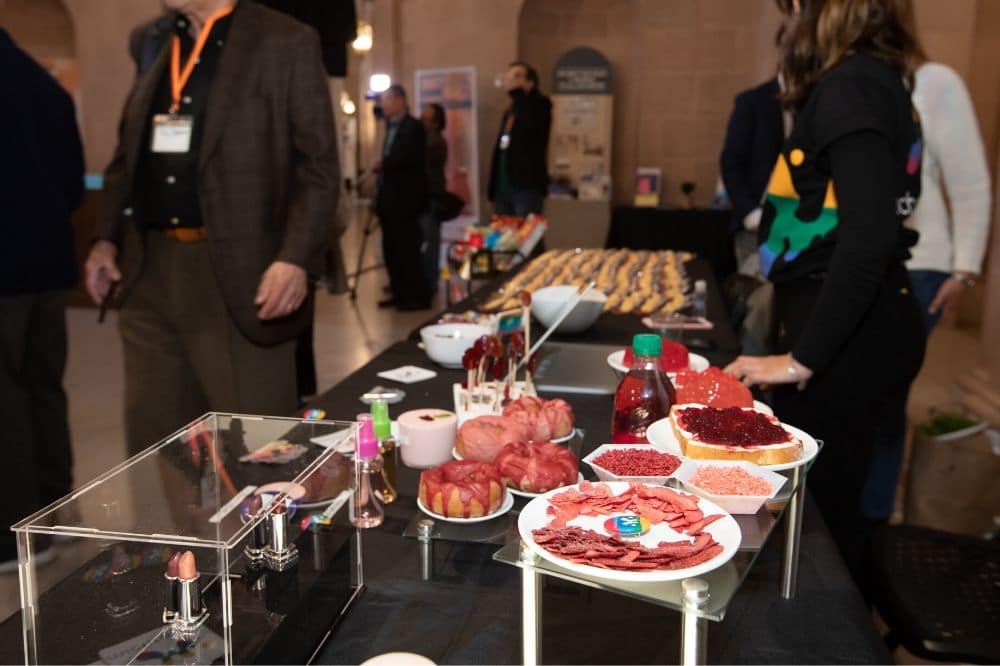If engineering biology has the potential to improve almost every aspect of our lives, then IndieBio’s Class Nine is putting it to the test. On Thursday, February 6, eleven startups took the stage to show us a brighter future through biology.A friend convinced me to attend this event, so I headed to San Francisco one afternoon after class, not knowing what to expect. What quickly became apparent was that although these startups all fell under the umbrella of biotechnology, they had taken very different approaches. To understand the diversity of applications that were represented on stage, I categorized them into a few archetypes that you may recognize across the biotech and synthetic biology spaces.
A fresh take on pharmaceuticals
Lupa Bio and Diadem Biotherapeutics are looking for new answers in the age-old space of drug discovery. Many anti-inflammatory medications come with a laundry list of potential side effects. Therefore, Lupa Bio is testing the safety of a molecule that regulates the immune system and is found in mother’s milk. Meanwhile, Diadem is tackling inflammation by expressing signaling proteins on the surfaces of exosomes, allowing them to hack the conversations between cells.While each are making breakthroughs in well-established fields, the microbiome startups in the second category are tackling a field that is too young for precedent.
The ecology inside us
Long overlooked but now in the spotlight, the microorganisms in our gut have been linked to everything ranging from cancer to Alzheimer’s to depression and sleep. This has generated many promises about our imminent ability to engineer our microbiomes, but can those promises really be fulfilled?The excitement surrounding the microbiome was represented at IndieBio by BioLumen and Pando Nutrition. BioLumen is developing a package of fiber that absorbs sugar from the stomach and converts it to food for gut microbes, while Pando Nutrition is improving the microbiomes of livestock in lieu of using antibiotics. Although it is unknown whether we will one day be able to truly understand the microbiome, the message is clear: we never live in isolation, and we are not unique in possessing a microbiome that impacts our health.
Biology can do it better
However, there is more to biotech than health. Many of the startups at IndieBio are proving that biology can do it better, faster, and safer. For example, the melanin in our skin and hair evolved to be extremely effective at blocking radiation. That's why Avisa Myko is manufacturing melanin to put in sunscreen. Or, take Michroma, which is synthesizing food dye from fungi instead of petroleum. Chi Botanic is manufacturing important plant compounds such as aloe powder and citrus oil in bioreactors instead of in the field. Finally, Primitives is making smart, degradable bioplastics that can tackle the plastic packaging industry.

Michroma uses CRISPR-engineered filamentous fungi to create food colors, and is already attracting interest from multinational food manufacturers, according to Food Navigator. Photo by O'Donnell PhotographyFrom plastic to food coloring, humans have learned to manufacture the things we need from petroleum. These startups will test whether biology can truly do it better. However, I believe that the true test of our ability to engineer biology will not be through a new idea, but rather what we have always tried and failed to do.
Milestones of science
Fertile land is a cornerstone for society, so farmers and researchers have been breeding crops that are more resistant to drought, stress, and salt for centuries. Now, Agrisea is hydroponically growing rice in the ocean, tackling world hunger both today and in the future. Meanwhile, Membio is a product of the decades-long quest for synthetic blood. This is one step towards a future with lab-grown organs and fewer preventable deaths. Diagnostics are becoming higher-throughput and more precise. With a single blood test and their digital platform, Dalton Bioanalytics can detect thousands of biomarkers that would otherwise require individual assays.
A future built on biology
If there is one defining feature of biology, it is that it is extremely complex. There is such a diversity of companies because we are in a period of uncertainty: nobody knows which applications of biology will ultimately be successful -- until you give it a try.As IndieBio brings science fiction to the present, Class Nine is part of the testing ground for establishing exactly how much we can engineer biology. Through them, those before them, and those yet to come, we are getting a sense of the ways biology might one day change our lives. https://www.youtube.com/watch?v=SAjiv_mGr20


















